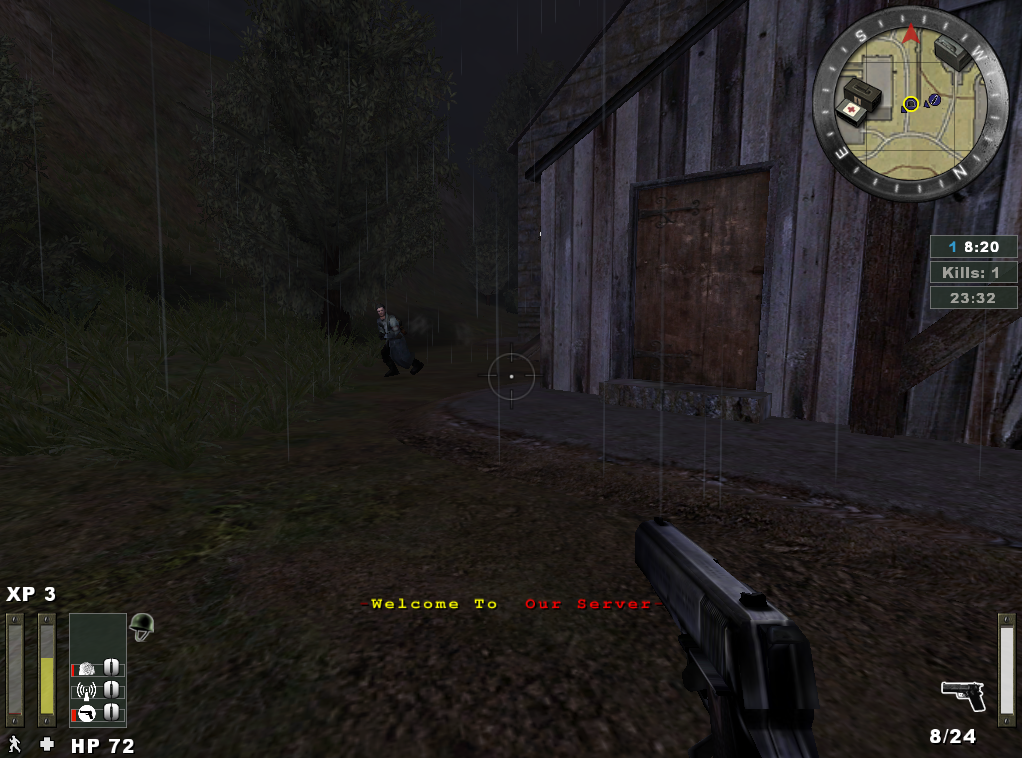

Wolfenstein: Enemy Territory is a 2003 freeware multiplayer game. As far as I know, it functions more or less identically to Return to Castle Wolfenstein, which came out a year before that. I haven’t ‘played’ Return, but I’ve played Return. Pretty much all WW2 games, when you get down to it, are the same; the selection of guns might be the different, the (almost always) threadbare plot changes, but the same set of morals is there.
WW2 is, to use a buzzword that I don’t like, Manichean. Almost completely black and white. This should pretty much go without saying. There is no clean Wehrmacht, Rommel’s ‘honor’ appeals only to late-empire Brits and weirdos who play too much Hearts of Iron, and Stauffenberg was a fascist whose disagreements with Hitler boiled down to who was being invaded. What interests me about WW2 games is their cosmology (medieval: the farther they are from America, the farther they are from God) and oddly absent sense of morality. They explain little: you know what they are, so why bother?
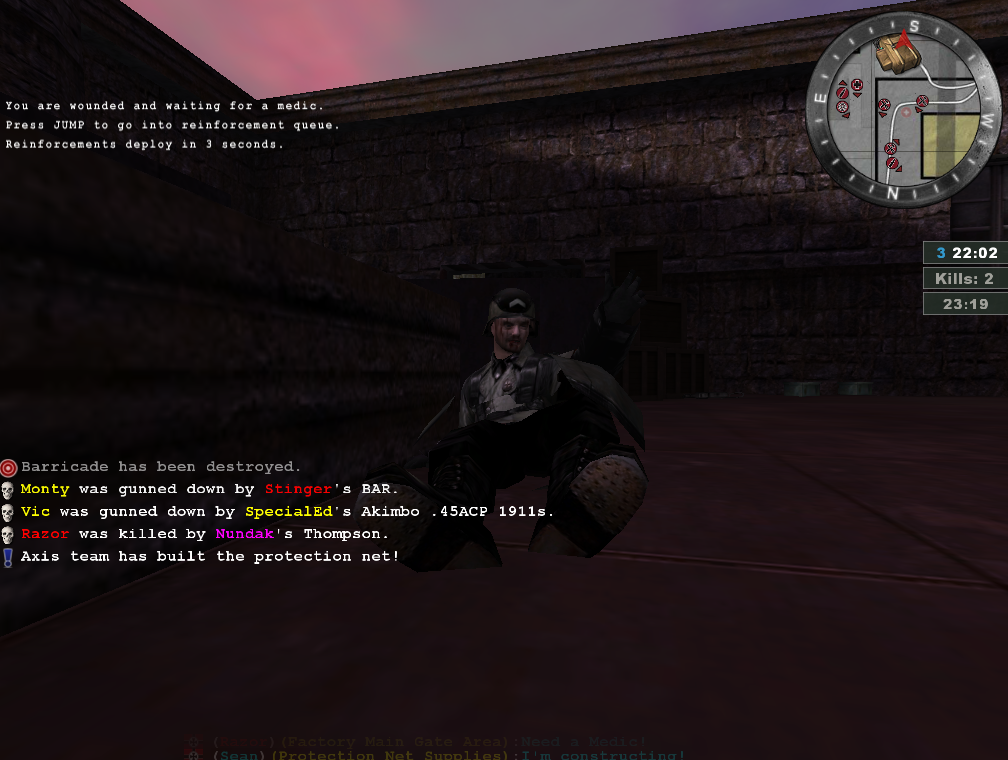
Because I feel like WW2 games represent a small facet of a larger, more sinister whole... more on that later!
ET, a multiplayer FPS that plays like a slower, more plodding version of Quake can’t exactly show why America’s involvement in World War Two was righteous and just and so on and so forth, so it deepens that cartoonish black-white morality. Nazis are evil because they’re evil: in the world of video games, this just is. It requires no explanation. The war’s meaning and morality are assumed; never will the game directly say ‘this is good’, even if on an ethical level outside of the game, yes, fighting fascism is good.
It is (amazingly!) the Platonic ideal of a WW2 game. Not the recent entries in the series, which have become increasingly cinematic and story-focused - a WW2 game of the type that existed from roughly the release of Wolfeinstein 3D to around Call of Duty: World at War. ET is the WW2 morality play minus morals or, more accurately, totally amoral. Both sides play identically, having access to what are, at their core, the same sets of weapons. It’s a well-balanced FPS. There are no tricks. No skins, no exploits, just two ostensibly different sides shooting each other. It is completely amoral. Reload Omaha Beach (roughly 8,000 dead.) Fight through the Battle of the Bulge (about 49,200.) Digitized, moving tableaus of one of the worst things to have ever happened in human history. I guess that’s the nature of multiplayer games.
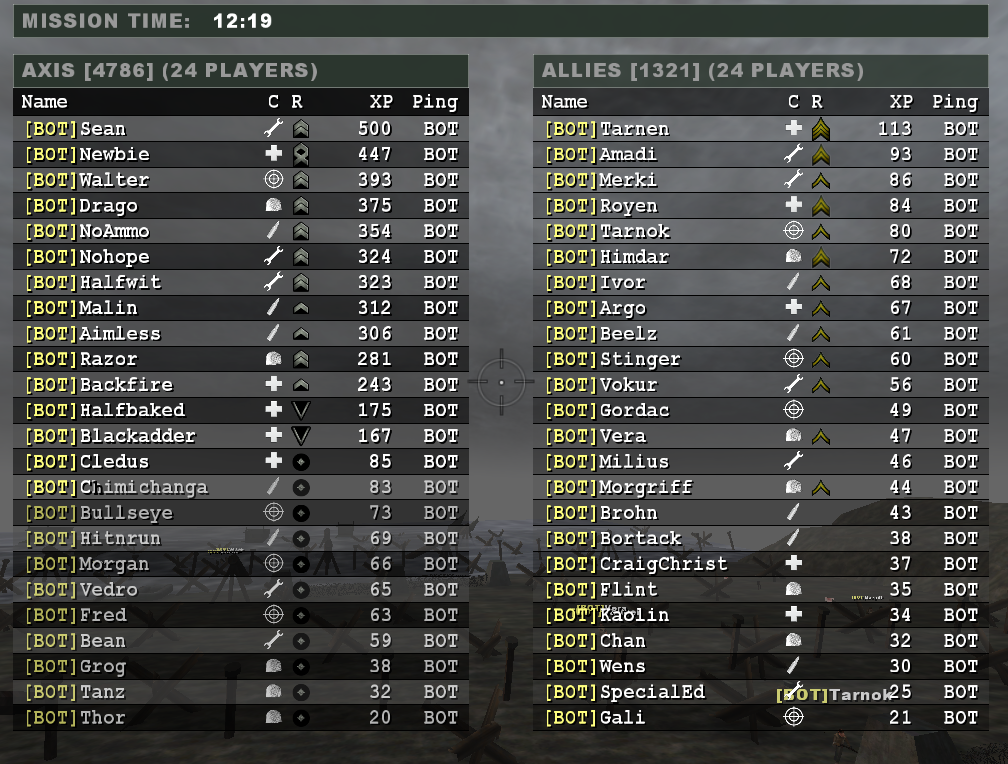
Shooting each other forever. As far as I can tell, most of ET’s many servers have been running for years, peopled almost completely by bots. Digital Valhalla: there are no stakes. There never really were but, the human element absent, what does it matter who wins or loses?
Not to say that the game is dead, or undead, or whatever. No, ET is a vampire: someone is still paying for these servers. For how long is a mystery and how it slips their notice has an imaginable answer. The hosting is probably cheap enough, maybe a few bucks a month. Really easy to miss unless you’re intentionally looking.
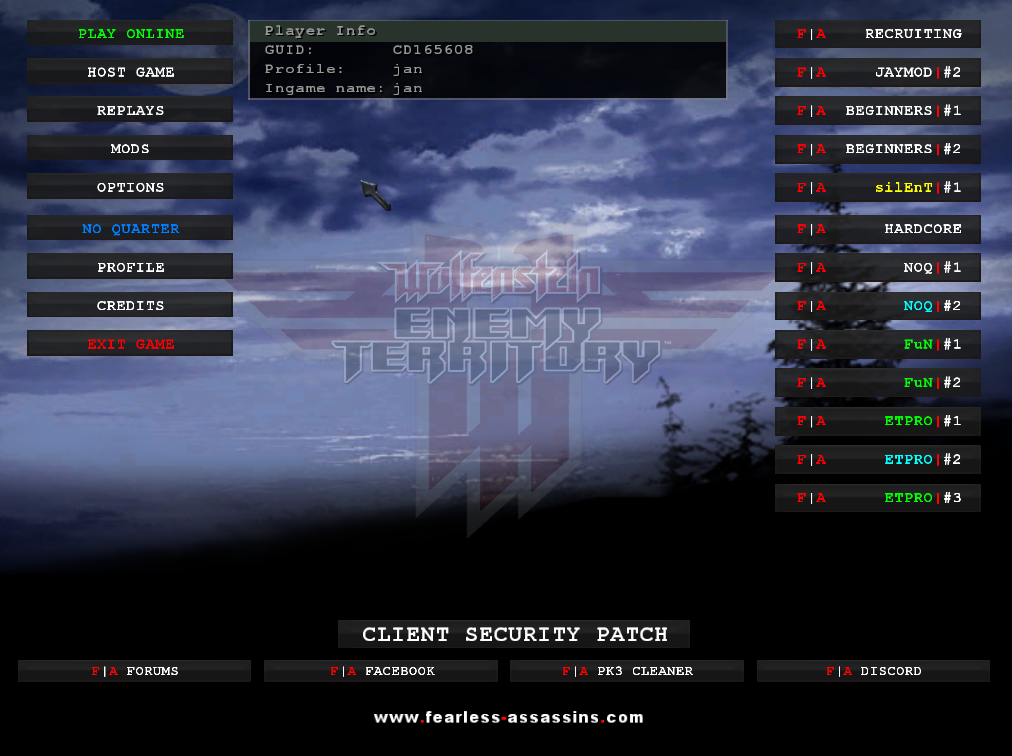
Hey, for what it’s worth, joining a random server filled with bots changed the main menu to an advertisement for a (apparently still active!) clan.
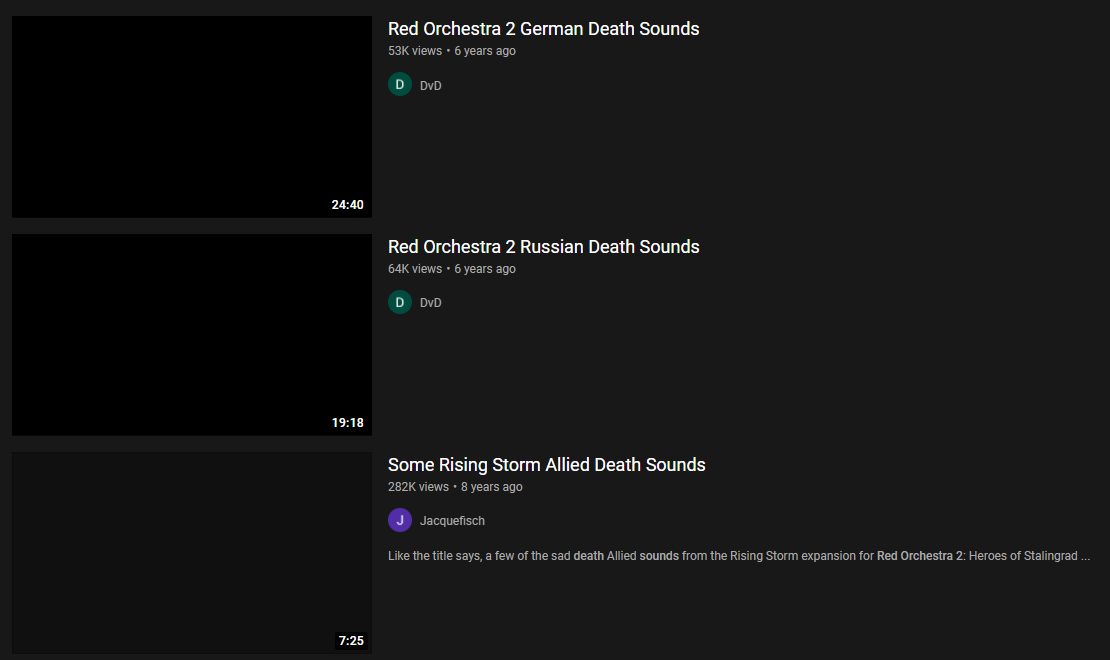
Getting away from ET from a second - Red Orchestra’s simulated wailing and agonized crying that comes when you gun down an enemy player are just that: simulations of human suffering. A weird attempt to render realistic the WW2 FPS, a genre of game that, quite frankly, has always had a tenuous connection to reality. The original Wolfenstein ends with you fighting Mecha-Hitler: these games are morality plays, plain and simple. Homo Fascismus does mad science and atrocity as second nature. By acknowledging that the other side is (terrifyingly) human, it ceases to really be a WW2 FPS and becomes something different. Red Orchestra 2 is a square block trying to pass through a circular hole.
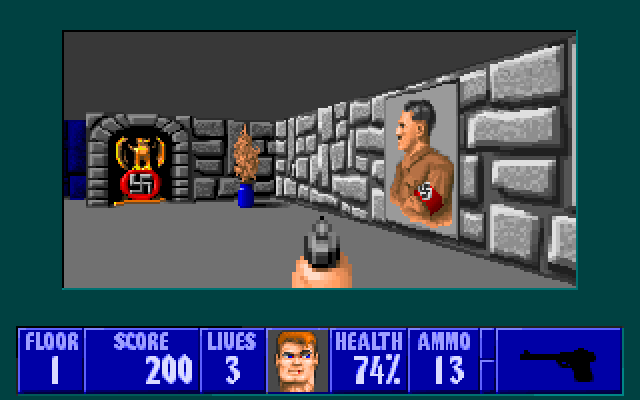
These games are amoral despite the clear-cut reality of what they depict because of just that - they’re games. You can replace Hitler with, I don’t know, Petr Fiala and all the polygonal or pixelated fascists with walking, gun-wielding houseplants, it’s the same. Nothing is changed. There is no meaning behind the screen.
The context that the majority of these games came from is worth mentioning; you can excuse the simplicity of Wolfenstein 3D by pointing out that it’s from 1992, which is, yeah, fair, but most of these games function as propaganda for American interventionism, whether directly or indirectly. Why do you think this genre was at its absolute peak during the invasion of Iraq and the most hands-on era of the (still ongoing!) occupation? It’s not a coincidence. You’re meant to internalize, associate American intervention with these morally blank depictions of one of the only justifiable wars this country fought. It’s insidious.

That’s why WW2 is carelessly invoked ad nauseum in the public consciousness of the United States. Apolitically, too. It shouldn’t really require an explanation as to why equating modern-day Antifa with, say, the men who stormed Omaha Beach is ridiculous, but just to illustrate the point, I’ll say this: the first flag to fly over Okinawa after the Japanese were more or less massacred there wasn’t the American flag. It was the Confederate flag.
It’s also worth mentioning that a poll in 1944 (TIME magazine, I think) asked Americans what should be done with the Japanese once the war was over. A quarter was in favor of exterminating them down to the last man, woman, or child. Genocide, to be blunt. Not to mention the well-documented mutilation of enemy corpses and what G.Is did to civilians during the occupation. That’s why incinerating hundreds of thousands has to be justified over and over again, why they need to wring their hands and say ‘well, if we didn’t, then think of what we’d have to do’, ignoring that Japan’s surrender had more to do with the Soviet invasion of Manchuria than the atom bomb. Why Tibbets could sleep at night. Why a war that’ll be a hundred years old in two short decades still lives as vibrantly in 2021 in the heads of Americans as it did in 1945. It’s a myth, and these games are a large part of it in the 21st century.
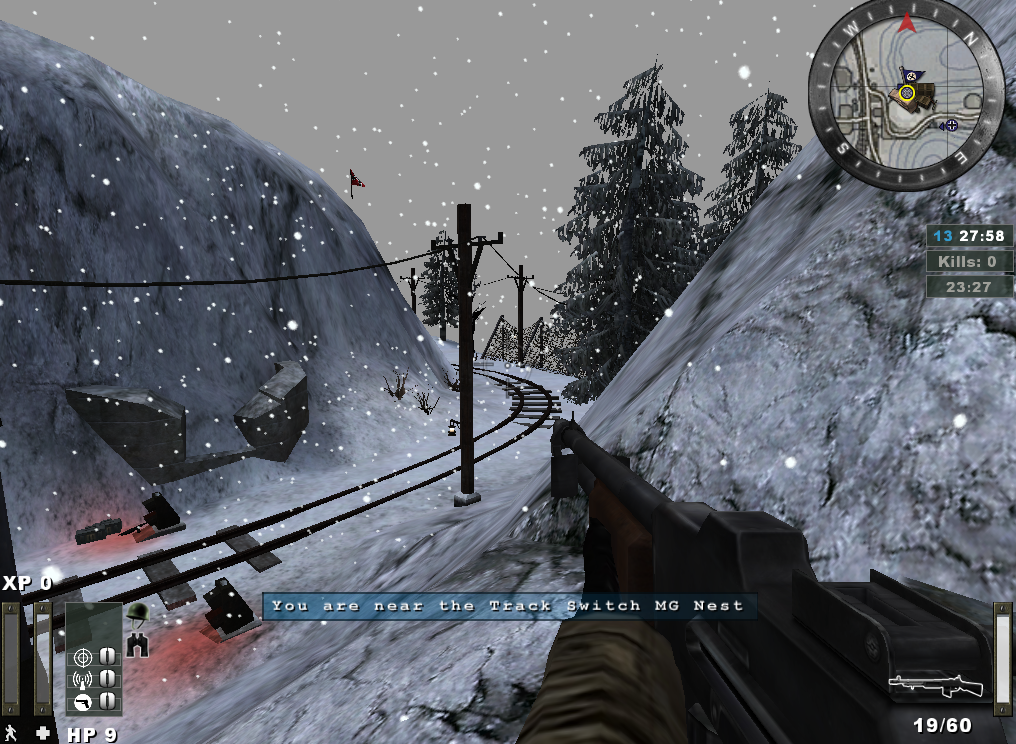
To get to the point, WW2 games function as morality plays, ones whose morals – bereft of context – are almost completely inscrutable. That doesn’t mean that a lot of them aren’t fun, though, or that recent games set during WW2 take a more nuanced approach. These are just my thoughts on the very specific period of WW2 games that I’m most familiar with. Either way, hopefully it made you think a little about the purpose media like this serves. See ya later!
